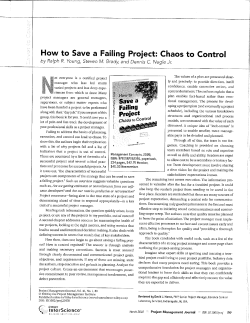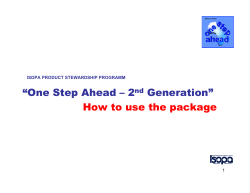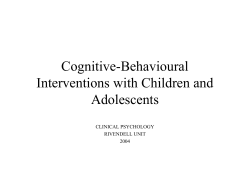
presentation - University of Kent
Staff on the Naughty Step: Dealing with counterproductive workplace behaviour Sandra Henry School Manager, School of Languages and Cultures, University of Sheffield and Network Coordinator AUA Departmental Administrators Network AUA Branch Meeting, University of Kent Thursday 10 July 2014 Tracy & Olivia • https://www.youtube.com/watch?v=TuJxsLE7Dgc Definitions and terminology Workplace ASB Workplace Incivility •"..any behaviour that brings harm, or is intended to bring harm to an organisation, its employees, or its stakeholders" • low intensity deviant behaviours that are rude and discourteous, with ambiguous intent to harm the target •E.g.: confidentiality violations, fraud, aggression, discrimination, theft, violence, sabotage, lying, harassment, revenge and whistleblowing •E.g.: interactions which are demeaning, abusive, derogatory, or threatening, social isolation, rudeness CWB •"An emotionbased response to stressful organizational conditions." •"A cognition-based response to experienced injustice." •E.g.: Overt acts: aggression, conflict, sabotage and theft. Passive acts: doing work incorrectly, and failing to follow instructions. Dysfunctional Behaviour Organizational Misbehaviour Organizational Deviance • acts that have negative consequences for individuals/a group of individuals (a team) and/or the organization itself. • "..anything you do at work you are not supposed to do.” working against core organizational and/or societal norms) • "behaviour which violates significant organizational norms and in doing so threatens the well-being of the organization, its members, or both." •E.g.: violent aggression, physical and verbal assault. Nonviolent: theft, revenge, absence, drug/alcohol use. •E.g.: sabotage, failing to work hard/consistently, practical joking, pilferage,, sexual misconduct •E.g.: spreading rumours and embarrassing coworkers, theft, sabotage, bullying, sexual harassment What CWB is not: • Labelling people. • Genuine sickness absences. • Genuine medical conditions, for which a diagnosis exists. • Genuine differences of opinion or disagreements expressed in a respectful way. • Authorised absences/lateness. Harm aimed at an organization Coming to work late without permission Sabotage Timewasting Facebook Taking long breaks Trying to look busy while doing nothing Being rude to customers Absenteeism Failing to report a problem so that it gets worse Presenteeism Leaving early without permission Harm aimed at an individual Derogatory or nasty comments Negativity Hostility Facebook Silent protests Not returning a phone call to someone you should Outbursts (crying/anger) Skiving Ignoring someone at work Playing games Misuse of humour Criticism/undermining others Dirty looks Making someone look bad Verbally abusing a colleague Bullying Bullying characteristics Being ignored Withholding information Unrealistic targets Belittling remarks Intimidation Criticisms Excessive work monitoring Feeling being cut off Being shouted at Afraid to take sick leave Verbal & physical threats Ayoko, Callan and Hartel 2003 Bullying emotions Stress Anger Confusion Powerlessness Depression Feeling undermined Sadness Feeling isolated Humiliation Fearful Performance problems Time wasting Shirking Withholding effort Job neglect Withholding efficiency Noncompliance Slow working Ignorance about rules Not following procedures Costliness of CWB (1) Staffing problems: • • • • • • • • • Retention issues Wellbeing Morale Disruption to teams Problematic working relationships Commitment Staff turnover Sickness absence Recruitment costs Costliness of CWB (2) Mental health related difficulties • Stress • Anxiety • Workplace depression • Nervous conditions • Emotional distress • Panic attacks organizational & interpersonal Production Deviance Property Deviance Leaving early Sabotaging equipment Taking excessive breaks Accepting kickbacks Intentionally working slow Lying about hours worked Wasting resources Stealing from company Political Deviance Personal Aggression Showing favouritism Sexual harassment Gossiping about co-workers Verbal abuse Blaming co-workers Stealing from co-workers Competing non-beneficially Endangering co-workers Exercise A member of your team is unhappy with her performance review. She believes the feedback and rating you gave her are not fair or accurate, and she responds by badmouthing you, to the rest of the team, and her comments get back to you. Is this a problem? How would you handle it? Key features of CWB Individual differences Situational factors Cognitive processing CWB Some reasons for CWB • • • • • • • • • • Boredom Role conflict and/or role ambiguity Unhappiness with grade/job Job stress related to role conflict and ambiguity, and workload Negative feedback from the manager Feeling betrayed or let down by a manager or senior staff Perceived injustice Unrest/uncertainty (change) Restructures or office reorganization Frustration The role of frustration Environmental Frustrator Cognitive Appraisal Experienced Frustration Behavioural Reaction (Spector 1997) Passive leadership Definition: “Managers who display a passive leadership style model an apathetic, indifferent mode of behaviour consistent with the “whatever” mentality that allows incivility to flourish.” Harold and Brian (2014) Passive leadership • What is it? • a reticence to act or failure to provide leadership • a lax, informal work environment • a pattern of inaction • neglecting workplace problems • less likely to define and clarify behavioural expectations • generally don’t take proactive steps to model and reward appropriate conduct Harold and Brian (2014) Examples of Workplace incivility: negative eye contact giving someone the silent treatment asking for input and then ignoring it "forgetting" to share credit for collaborative work, or not giving credit where its due • waiting impatiently over someone's desk to gain their attention • side conversations during a formal meeting or presentation • public reprimands • • • • Personality…. Psychopaths, Narcissists, Machiavellian’s PSYCHOPATHY Superficial charm Lack of Remorse Irresponsible Egocentric NARCISSISM Antisocial Fantasies of power Need for admiration MACHIAVELLIANISM Sense of entitlement “views and manipulates others for his/her own purpose” Lack of empathy Exploitation People Management 2010 Charisma (good with people) Superficial charm Self-confidence Grandiosity/pomposity Ability to influence Manipulative Persuasive Exploitative Risk taker Impulsive Visionary thinker Fantasies of power Action oriented Poor at planning People Management 2010 Undesirable traits Desirable traits Personality traits CWB involving Facebook • • • • • Virgin Atlantic New Park Nursing Home Royal Bank of Scotland Argos Royal Scots Guard 'Her and William drove past me on Friday and all I got was a s****y wave while she looked the opposite way from me, stupid, stuck-up cow. Am I not good enough for them! Posh b****. Who really gives a f*** about her?' What can managers do? The goal is to develop the skill of stepping outside the situation to ask “what’s happening, why is it happening”, and then using this understanding to take positive action. CWB caused by the manager? • Failing to understand their own managerial style, and the role this plays in the situation • Excusing CWB because of “talent” • Failing to act • Failing to address problems as they arise • Showing favouritism • Being inconsistent • Setting a bad example • Job design and management procedures Nick and Carol • http://www.youtube.com/watch?v=KpS8P4Trdqc Managerial action (1) (corrective &/or preventative) • Understand your own managerial, professional and behavioural style. • Adopt vigilant selection and management procedures. • Facilitate good communication. • Consider the role that structure, job design and processes play in creating CWB or other deviant behaviour. • Look how work is allocated. Managerial action (2) (corrective &/or preventative) • Implement effective supervision/line management • Adopt a zero tolerance approach…how? • Get help (HR, Line manager, peers) • Develop your ability to deal with difficult situations (training, skill building) • Tackle bad behaviour Sandra Henry s.henry@sheffield.ac.uk 0114 2228454
© Copyright 2025










